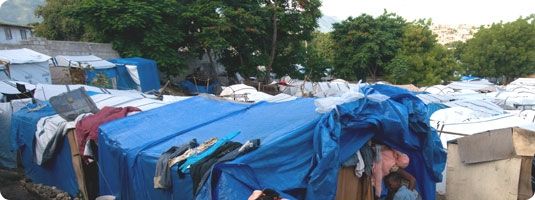Empowering Young Leaders in Haiti

Vivian and her husband live in the urban tent camp of Aloune, in Port-au-Prince. Like many of the 120 other families living in Aloune, the home they had been renting was destroyed in the January 2010 earthquake, and they have not yet been able to secure their own land for construction of more permanent housing. Before the earthquake, Vivian made a living selling beauty products such as creams, powders and makeup. But when the quake hit, she lost her inventory and has been unable to recover funds to reinvest in trading.
CEDDISEC (Centre Diocésain de Développement Intégré et de Secours), the relief and development arm of the Episcopal Diocese of Haiti and Episcopal Relief & Development’s partner in the country, has been heading up disaster relief and recovery efforts since the earthquake two years ago. Beginning with emergency assistance to thousands of people in displacement camps, and transitioning to short- and long-term recovery activities, the organization currently supports people in the areas of housing, employment opportunities and micro-credit, among others.
Another of CEDDISEC’s programs is the Protection and Empowerment initiative, which enables members of its Youth Brigade (made up of 18 university students) to influence and transform the perspectives of other young adults in the camps with regard to issues of violence, and particularly gender-based violence. Through the Protection and Empowerment initiative, Youth Brigade members work with people between the ages of 18 and 34 in four urban tent camps. They lead dialogues and learning sessions, and coordinate camp debates and cultural competitions with music and skits relating to gender and gender-based violence issues. As part of the activity, participants identify important messages and actions they can bring to their friends, families and neighbors to promote a culture of peace, and specifically improve women’s feelings of security and personal safety in the camps.
Vivian has been a regular participant in Youth Brigade activities, and is eager to participate in the new Cash-for-Work opportunity in her camp. Since April 2010, CEDDISEC has launched 138 Cash-for-Work projects, led by members of the community and employing around 4,800 people to date. The Youth Brigade’s Cash-for-Work project in Aloune responds to the economic hardship that young people living in the camp continue to face, and it aims to increase personal security in the camp, especially for women, by constructing dedicated shower facilities.
Vivian predicts that she and her husband – with whom she is splitting the work days – will earn approximately $200 for 40 days of work. Vivian’s dream is to use her share of the wages to buy goods and restart her trading business.
Vivian is grateful for the opportunity to work and earn much-needed income, but she is also glad to be part of the Youth Brigade because it has helped her feel less shy discussing important decisions with her husband – including how they might share their work, their wages, and their dreams for a better future.
“The Youth Brigade is probably one of the most unique of CEDDISEC’s programs, in terms of reinforcing young people’s ideas and sense of empowerment, and providing them a space to be part of Haiti’s future,” said Tammi Mott, Program Officer for Episcopal Relief & Development. “Through their reflection dialogues and debates, youth are discovering and identifying ways that they can improve life in the tent camps and promote an environment of respect and protection. CEDDISEC’s introduction of a Cash-for-Work project in the camp is an added reinforcement that will give young people not only a voice but also a way to earn income. It’s a great example of an integrated program addressing the multiple challenges that quake survivors continue to face.”
To learn more about the Protection and Empowerment initiative and other long-term response programs in Haiti, please visit www.episcopalrelief.org/Haiti.


